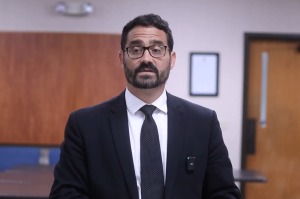Do you have a God-given right to defend yourself?

As of this writing, the trial of Illinois teenager Kyle Rittenhouse is concluding. You may have heard about it: Kyle went to the BLM riots in Kenosha last summer in the community where his father lives.
Because he was going into what was arguably a domestic war zone, he armed himself with a rifle (Kyle is too young to purchase a handgun, but legally old enough to possess a rifle) to defend himself if the need arose. And it did.
While there, Kyle shot three people who attacked him, killing two of them. The key question of the trial naturally centers on the question of self-defense.
If you’ve viewed any of the trial proceedings, and the videos accompanying it, the answer seems obvious. The prosecution’s star witness who was shot by Kyle, Gaige Grosskreutz (a declared communist who admitted he was illegally carrying his firearm, had been previously arrested for felony burglary, and tried to sue the city of Kenosha for $10 million), admitted on the stand that he was shot only when he aimed his handgun at Kyle:
DEFENSE ATTORNEY CHIRAFISI: It wasn’t until you pointed your gun at him, advanced on him, with your gun — now your hands down, pointed at him — that he fired, right?
GROSSKREUTZ: Correct.
The exchange caused one of the persecuting, er “prosecuting,” attorneys to bury his head in his hands. The reason? The admitted-to scenario is the living definition of self-defense. Case closed.
Predictably, the leftist media and entertainment world, who are irredeemable liars, have maligned and slandered Kyle. With no supporting evidence, they’ve called him everything from a domestic terrorist to a white supremacist, with even Joe Biden putting out a video implying Kyle is the latter.
I find that lie particularly confusing since those shot by Kyle were all white men who were attacking him, but hey, that’s me.
Since the leftist media is rarely "right," their irrational reaction to the trial speaks volumes to Kyle being innocent. It reminds me of a statement made by David Berlinski about the Discovery Institute in his book The Devil’s Delusion: “That the institute has been vilified by all the right people is a special sort of satisfaction.”
The Rittenhouse trial aside, a question that comes up in Christian circles with respect to self-defense is, do we have a God-given right to protect ourselves and others from harm? Let’s look at what the Bible says.
Self-defense and Scripture
It’s a good bet that those founding America believed the Bible supports self-defense, with part of our Constitution reading: “We hold these truths to be self-evident, that all men are created equal, that they are endowed by their Creator with certain unalienable Rights, that among these are Life, Liberty and the pursuit of Happiness.”
If you believe you have the right to life, then by default you also embrace the right to possess the means to guard your well-being, which is one of the reasons why we have the second amendment. As John Adams said, “Arms in the hands of citizens may be used at individual discretion for the defense of the country, the overthrow of tyranny, or private self-defense.”
But what biblical support exists for that belief? Actually, quite a bit.
We start with the distinction made in the Old Testament with the ten commandments, particularly, “You shall not murder.” The Hebrew word תִּֿרְצָֽ֖ח׃ is specific in its meaning: “murder” not “kill” (a different term) with the takeaway being there are situations where the act of killing someone – such as in self-defense – is not wrong.
An example of this is found in Exodus 22: 2-3: “If a thief is caught breaking in at night and is struck a fatal blow, the defender is not guilty of bloodshed; but if it happens after sunrise, the defender is guilty of bloodshed. He shall surely make restitution; if he owns nothing, then he shall be sold for his theft.” The difference between the day and night situations may be that the homeowner is able to more easily halt the intruder or rely on others for help in stopping them.
Another illustration is found in the book of Esther: “By these letters the king permitted the Jews who were in every city to gather together and protect their lives — to destroy, kill, and annihilate all the forces of any people or province that would assault them” (8:11-12).
When it comes to possessing weapons to protect oneself and others, a good example is found in Nehemiah. In order to keep his people from being harmed by those trying to stop the rebuilding of the city, Nehemiah had them arm themselves: “From that day forward, half of my men were doing the work and half of them were taking up spears, shields, bows, and body armor…Those who were carrying loads did so by keeping one hand on the work and the other on their weapon. The builders to a man had their swords strapped to their sides while they were building” (Neh. 4:16-18).
As a quick side comment on possessing weapons, the Bible notes the practice of disarming citizens by tyrannical rulers so they cannot defend themselves: “Now no blacksmith could be found in all the land of Israel, for the Philistines said, ‘Otherwise the Hebrews will make swords or spears’’’ (1 Sam. 13:19-22).
What about defending the lives of others? When Lot and his people were captured, Abram rescued him with force (Gen. 14:13-16). Deuteronomy 22:23-27 implies that others are to come to the aid of a woman being assaulted. Psalm 82:4 says, “Rescue weak and needy people. Help them escape the power of wicked people.”
In the New Testament, Jesus prescribed keeping weapons for self-defense to His disciples when He said: “But now, whoever has a money belt is to take it along, likewise also a bag, and whoever has no sword is to sell his coat and buy one” (Luke 22:36). Up to that point, Christ had sovereignly arranged for their protection and support but now tells them to use normal means to provide the same.
Christ also alludes to having means of self-defense when He says, “But no one can enter the strong man’s house and plunder his property unless he first binds the strong man, and then he will plunder his house” (Mark 3:27).
Keep in mind that God provides us with a spiritual means of self-defense against our invisible foes (Eph. 6:10-17); it only stands to reason He wants us to have the capabilities of protecting ourselves against physical enemies as well.
Objections to self-defense
Some have tried to argue against a Christian’s right to self-defense by quoting Christ’s words of: “do not resist an evil person; but whoever slaps you on your right cheek, turn the other to him also” (Matt. 5:39). Then there is the case of Jesus telling His disciples to stop fighting with the sword when He was arrested in the Garden of Gethsemane (Luke 22:49-53).
However, both are poor arguments as the first signifies the way insults (not physical harm) were referenced in the ancient world. The second refers to Jesus’ objective of going to the cross and not allowing anything to prevent that: “So Jesus said to Peter, 'Put the sword into the sheath; the cup which the Father has given Me, shall I not drink it?'” (John 18:10).
Another biblical objection raised against self-defense comes from James: “you have condemned and put to death the righteous man; he does not resist you” (James 5:6). Many commentators state that what James is referring to are the end results of court proceedings where the rich were, by legal means, unjustly robbing helpless people who weren’t opposing them and had no way to defend themselves.
Further, an episode in Paul’s life demonstrates that Christians aren’t supposed to blithely allow harm to themselves: “If, then, I am a wrongdoer and have committed anything worthy of death, I do not refuse to die; but if none of those things is true of which these men accuse me, no one can hand me over to them” (Acts 25:11).
Finally, what about those who willingly become martyrs (e.g., “they did not love their life even when faced with death” (Rev. 12:11))? The key distinction to remember here is the Grand Canyon difference between suffering/dying for your faith and allowing yourself or others, in a societal sense, to be raped, beaten, abused, or murdered by evil people without opposition.
The conclusion of all this is that Scripture has strong support for Christians defending themselves as well as possessing the means to carry out that defense.
With Kyle Rittenhouse, it’s no surprise that his enemies are enraged that an American citizen would use his Second Amendment rights to defend himself against an unprovoked assault from one of their leftist stormtrooper mobs. This crowd reminds me of a statement made by the Beth Dutton character in the series Yellowstone: “You crave trouble, you just don’t want resistance.”
Mobs may expect (or demand) no pushback to the crimes they want to commit, but it is Kyle’s – and our – God-given right to fight back, using force when necessary.
Robin Schumacher is an accomplished software executive and Christian apologist who has written many articles, authored and contributed to several Christian books, appeared on nationally syndicated radio programs, and presented at apologetic events. He holds a BS in Business, Master's in Christian apologetics and a Ph.D. in New Testament. His latest book is, A Confident Faith: Winning people to Christ with the apologetics of the Apostle Paul.



























